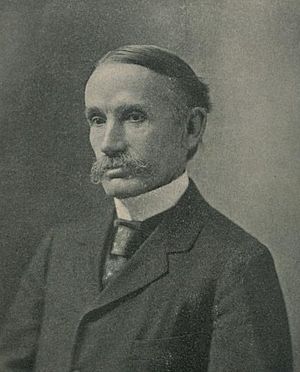John Bates Clark facts for kids
Quick facts for kids
John Bates Clark
|
|
|---|---|
 |
|
| Born | January 26, 1847 Providence, Rhode Island, US
|
| Died | March 21, 1938 (aged 91) New York City, US
|
| Institution | Carleton College Johns Hopkins University Columbia University |
| School or tradition |
Neoclassical economics |
| Alma mater | Amherst College |
| Doctoral advisor |
Karl Knies |
| Doctoral students |
Henry Moore Alvin Saunders Johnson |
| Influences | Karl Knies |
| Signature | |
John Bates Clark (born January 26, 1847 – died March 21, 1938) was an important American economist. He was a key thinker in neoclassical economics. This is a way of thinking about how people make choices and how markets work. He spent most of his career as a professor at Columbia University.
Contents
Biography
John Bates Clark was born and grew up in Providence, Rhode Island. He finished college at Amherst College when he was 25 years old.
From 1872 to 1875, he studied in Europe. He went to the University of Zurich and the University of Heidelberg. There, he learned from Karl Knies, who was a leader of the German Historical School. This school of thought looked at how history and society affect economic rules.
Clark taught economics at Carleton College from 1875 to 1881. After that, he moved to teach at Smith College. He also taught at Amherst College and Johns Hopkins University. Finally, he taught at Columbia University.
Early in his career, Clark's ideas were influenced by his German teachers. He was a bit critical of capitalism. However, while teaching at Columbia University, his views changed. He became a strong supporter of the capitalist system.
His Economic Ideas
After returning from Europe, Clark wrote many articles. Many of these were later put into a book called The Philosophy of Wealth (1886). In this book, he shared his own ideas about how people value things. This was similar to what other economists like William Stanley Jevons, Carl Menger, and Léon Walras were also thinking.
From Critic to Supporter
Before 1886, Clark had some ideas that were like Christian socialism. He thought that competition alone might not solve all problems, especially with wages. He hoped that social problems could be fixed through changes and improvements.
Clark believed that if workers and owners worked together, fair wages could be set. This could happen through discussions and agreements.
However, his ideas about fair wages changed around 1886. He started to defend the idea of a competitive system. It is not fully known why his views shifted. But by the time he wrote The Distribution of Wealth, he believed that pure competition was the natural way for the economy to be fair. One reason for this change might have been events like the Haymarket Riot in Chicago in 1886. This event led to changes in how universities viewed certain social ideas.
Competition and Wealth Distribution
In 1888, Clark wrote Capital and Its Earnings. The main idea in his later work was competition. He believed that if nothing stopped competition, progress would continue forever. This idea is a very important part of neoclassical microeconomics.
Clark explained this idea more in 1891 and then in his 1899 book, The Distribution of Wealth. Other economists, like John Atkinson Hobson and Philip Wicksteed, also came up with similar ideas.
Clark's main message was this: what a group of people in society gets is what they contribute to the total amount of goods and services produced.
Understanding Capital
Clark's ideas about capital were unique. He thought of capital not just as different machines or buildings. He saw it as an abstract, always existing "one great tool" used by people. This was similar to how one might think of a field or a waterfall as capital.
Clark's ideas about capital led to some debates later on. One famous debate was called the Cambridge capital controversy. This happened between economists at Cambridge University in England and MIT in the US.
Paul A. Samuelson's famous textbook, Economics, helped spread Clark's ideas about capital around the world.
John Bates Clark was also the father of another economist, John Maurice Clark.
Major Works
- The Philosophy of Wealth: Economic Principles Newly Formulated (1886).
- Capital and Its Earnings (1888).
- The Distribution of Wealth: A Theory of Wages, Interest and Profits (1899).
- Essentials of Economic Theory (1907).
- Social Justice without Socialism (1914).
See also
 In Spanish: John Bates Clark para niños
In Spanish: John Bates Clark para niños
- Marginal productivity theory
- John Bates Clark Medal
 | Dorothy Vaughan |
 | Charles Henry Turner |
 | Hildrus Poindexter |
 | Henry Cecil McBay |

